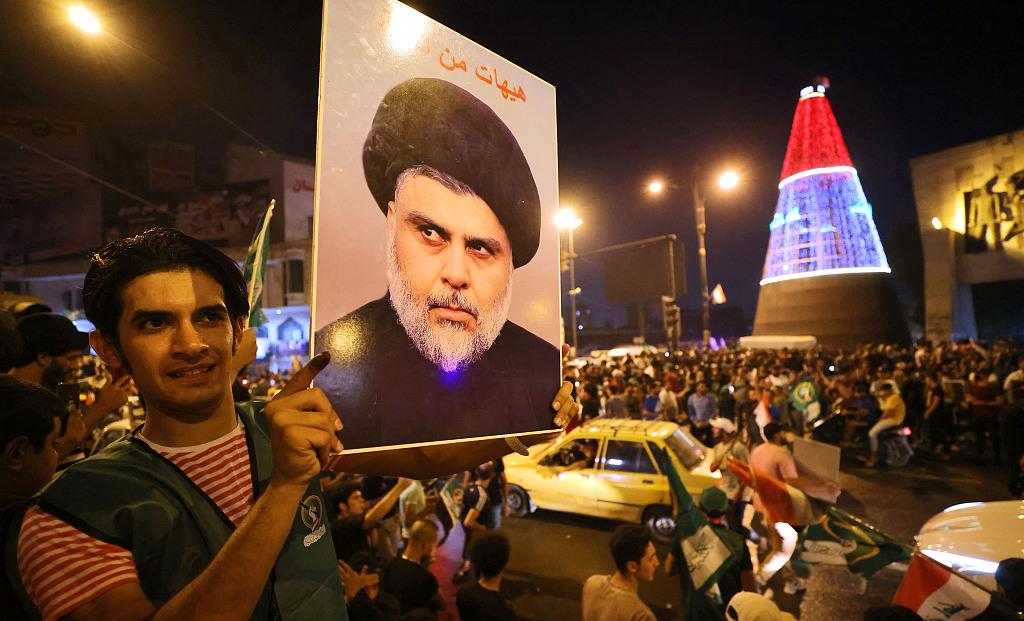Source: Global Times
Iraq's general election kicked off last weekend, and preliminary vote counts show that Shiite religious leader Sadr may be the biggest winner of this round of elections, and his political groups have won 73 of the 329 seats in parliament, far exceeding the 2018 election. In fact, as early as the beginning of the 21st century, Sadr was already a prominent figure in Iraq, and after years of deep cultivation, his influence spread throughout all important departments of the country and had a considerable right to speak in the political arena. Sadr, a self-styled "nationalist, opposes any foreign interference in Iraq, which the Iraqi people consider a symbol of resistance to foreign aggression. Sadr is also called "populist" by some Western media, he is firmly anti-American, but also opposes getting too close to Iran, the name of "double anti-hero" made Sadr popular with many Iraqi people, but also for his leadership of the "Sadr movement" in this election to gain a large number of votes.

On October 11, 2021, local time, Baghdad, Iraq, held a press conference on the results of the Iraqi parliamentary elections. After the results were announced, supporters of Iraqi Shiite religious leader Mukhtada Al-Sadr celebrated at Baghdad's Tahrir Square.
Sadr, 47, was born in the Shiite city of Najaf, where his father, Muhammad Sadr, was a respected religious leader and political figure in Iraq, at odds with Saddam Saddam, then-Sunni leader. Saddam Hussein's father and two brothers were assassinated in the late 1990s, and it was saddam's government that was believed to have ordered the assassination. After Saddam Hussein's fall, Sadder gathered thousands of supporters to launch the "Sadr Movement" and formed an armed force, the "Mahdi Army", to resolutely resist the invasion of Iraq by foreign forces. At that time, he published the famous "viper theory" - in a talk show, Saddell said that his old enemy Saddam Hussein was just a "small poisonous snake", and the United States was the real "big poisonous snake". Under Sadr's leadership, the influence of the Sadr Movement continued to expand, and even formed its own religious judiciary, law enforcement force, social service system, and prison administration system.
According to the official website of the US Atlantic Council, the joint forces led by the United States invaded Iraq and encountered stubborn resistance from the "Mahdi Army", which caused heavy casualties to the US military. In the early days of the U.S. occupation of Iraq, Sadr was firmly in control of southern Iraq, which is predominantly Shiite, and parts of the capital, Baghdad. The United States once installed a so-called "moderate religious leader" in the local area, and as a result, this person was assassinated in the street not long after his arrival, and it was said that it was Sadr who gave the assassination order. Newsweek said that Sadr is not only a "radical anti-American religious person", but also "the most dangerous man in all of Iraq".
However, the Sadr Movement also targeted Sunnis in Iraq early in its inception and was accused of forming "assassination squads" to abuse force. But Sadr denied he had been involved in similar attacks. According to Deutsche Welle, the "Mahdi Army" gradually lost support in 2007 due to bloodshed caused by the repression of the then government and internal Shiite fighting, and Sadr was forced to disband most of the armed forces in 2008, and he himself fled Iran. After about four years of "self-exile," he returned to Iraq in 2011 and his ideology began to tend to be "moderate," warning his supporters not to resort to violence.
After his return, Sadr began to enter Iraqi politics, and his armed groups gradually transformed into political organizations, dedicated to religious and social good causes such as preaching altars, building cities, and even cleaning up garbage.
Since 2016, the "Sadr Movement" has begun to penetrate the Iraqi people, vigorously promoting nationalism, and high-profile anti-corruption and reform with large-scale non-violent protests, pushing Iraq's "street politics" model to a new height. In the 2018 general election, Sadr's party won 54 seats in the Iraqi parliament.
Over the past three years, Sadr has become more focused on uniting forces, even beginning to curry favor with Sunnis and nonpartisans. Not only that, the "Sadr Movement" is also quietly infiltrating Iraqi government organs, and some core members have gradually been installed in key departments such as the Iraqi Ministry of the Interior and The Ministry of Defense, and many people have been "assigned" to oil, electricity, banking and transportation units. Reuters analysis believes that this series of personnel arrangements can bring sufficient financial security to Sadr's political operations - the financial allocations obtained by the government department where his "protégé" is located, accounting for almost half of Iraq's total annual budget in 2021. One of Sadr's assistants even made a high-profile claim that the "Sadr Movement" is currently at its peak since 2003, and that Sadr himself is the "most powerful man in iraq." However, the Government of Iraq has not commented on such claims.
In the 20 years since Sadr's rise, his political strategy and ideology have changed, but the anti-American stance has not changed. To this day, he still opposes U.S. interference in Iraq's internal affairs and insists on the withdrawal of all U.S. troops in Iraq. In addition, Sadr advocates a certain distance from Iran.